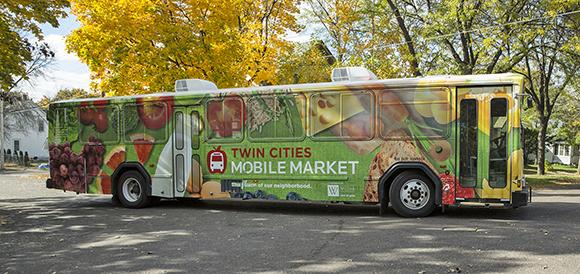Bus navigates nutritional barriers

The retired Metro Transit bus has been converted into a grocery store on wheels for those who don’t have access to fresh produce and healthy foods.
March 11, 2015
A quick trip to the grocery store keeps the pantry stocked and the fridge lined with basic fruits and vegetables—that is, if you can afford to pay the price. Fresh produce doesn’t always come cheap and, for some, the opportunity to eat healthy comes second to putting an affordable meal on the table.
Leah Driscoll, a 2012 Hamline graduate with a passion for helping those in need, developed a solution to this problem: a mobile market.
“It’s essentially a grocery store on wheels…where people may experience barriers accessing affordable food,” Driscoll said.
In a converted Metro Transit bus, the Twin Cities Mobile Market travels to urban food deserts—places often stricken by poverty, where residents do not have access to fresh and healthy foods. This causes an onslaught of health problems within these communities.
The Mobile Market is a branch of the Amherst H. Wilder Foundation, a nonprofit community organization, and it has one mission: “To make healthy food affordable and accessible for everyone in this community, regardless of where they live.”
Driscoll graduated from the Hamline School of Business three years ago with a Masters in nonprofit management. Hamline is the only school in the Twin Cities that offers such a program, and it has recently added a minor into the program.
“Nonprofits really touch all aspects of our lives, and we need good leaders and good managers within them,” said Jim Scheibel, a professor of practice at HSB. Scheibel was one of Driscoll’s instructors at Hamline.
“Nonprofits are mission-driven. People want to have an impact on changes and policies. People are living out and involved in their passions,” Scheibel said. “Leah is a good example of a passionate student.”
Scheibel elaborated on the value of the nonprofit management program, which allows students to connect to their passions in a real world setting.
“The program was able to let her explore,” Scheibel said. “I know it’s a great project she’s involved in. She’s really dreamt about this for a while. She was an outstanding student because she was there with a clear mission.”
The Mobile Market has been in operation since December, and Driscoll says that so far, it’s going well. The converted Metro Transit bus makes stops at 18 locations in high-need neighborhoods, where customers are able to select from a range of nutritional food items at an affordable price.
To provide fair access to everyone, the market accepts cash, credit, and food stamps. Fresh produce can be expensive, and the price only goes up in the winter months, so the Mobile Market controls for the steep costs of eating healthy.
“One woman said it was the first time she was able to buy berries in a year,” Driscoll said.
The food is supplied by Jerry’s Foods, which provides a discount to the Mobile Market purchases. During the summer, the fresh produce will be provided locally by the Hmong American Farmers Association. Besides making fresh food more readily available, the Mobile Market also supplies basic cooking supplies and necessities, including dairy products, meat, fish, grains, cooking oil and spices. The Market takes requests from customers about what they need most, and supplies the bus accordingly.
According to Driscoll, the neighborhood you live in plays a big role in determining your lifestyle.
“We’re really trying to level the playing field,” Driscoll said. “Healthy food is a basic right that everyone should have.”
The Mobile Market offers many volunteer opportunities. If interested in participating, visit http://www.wilder.org/Programs-Services/tcmm/Pages/default.aspx

